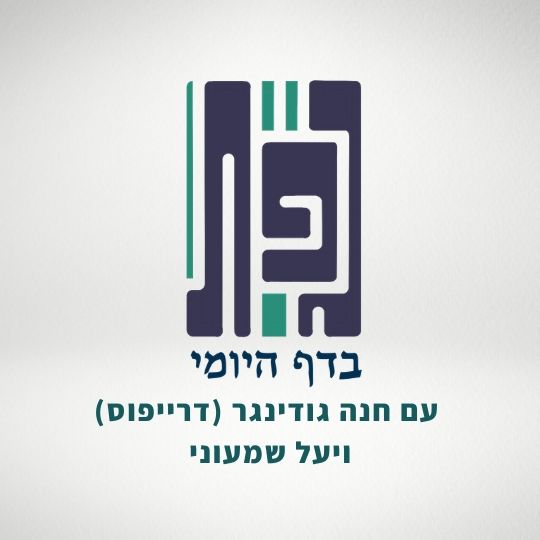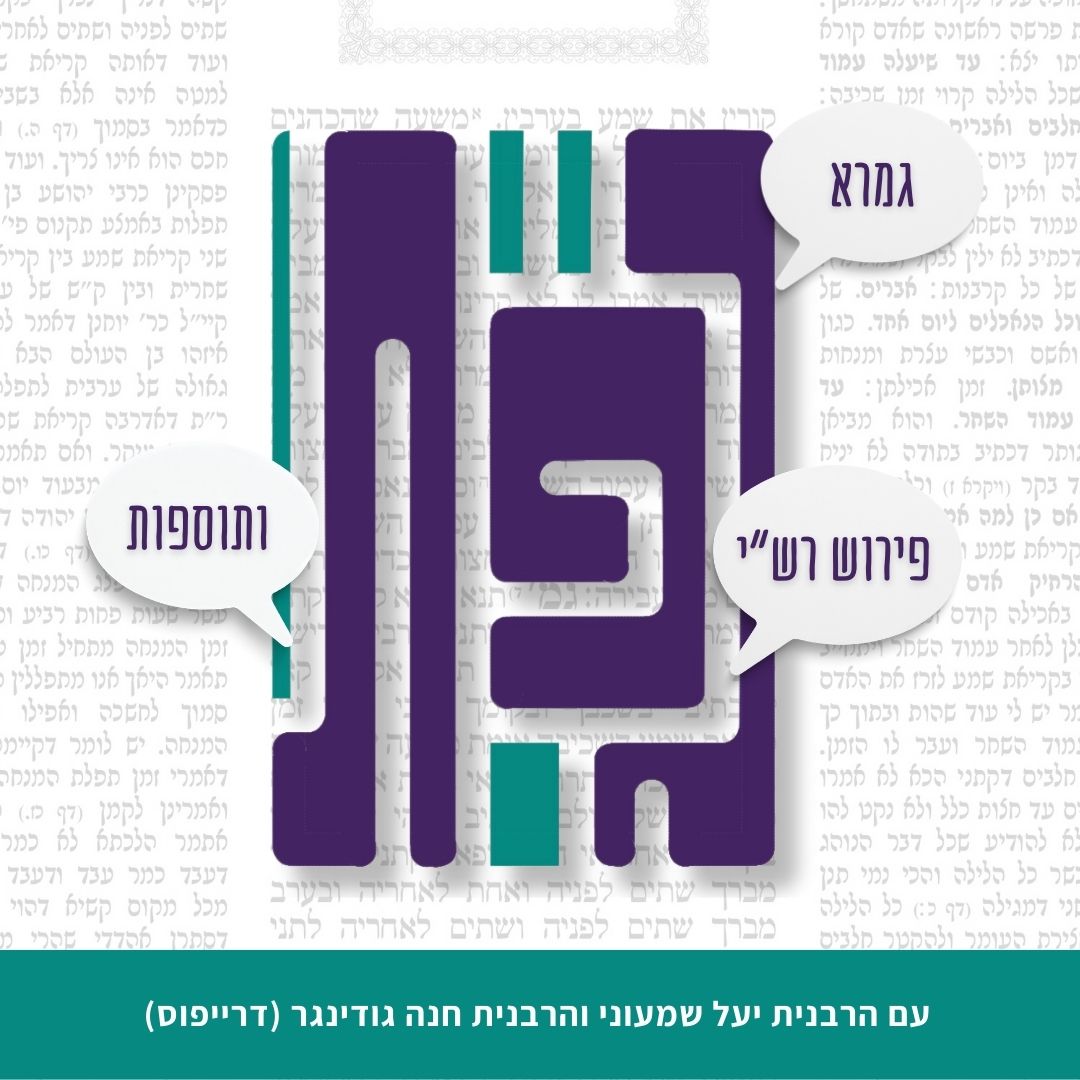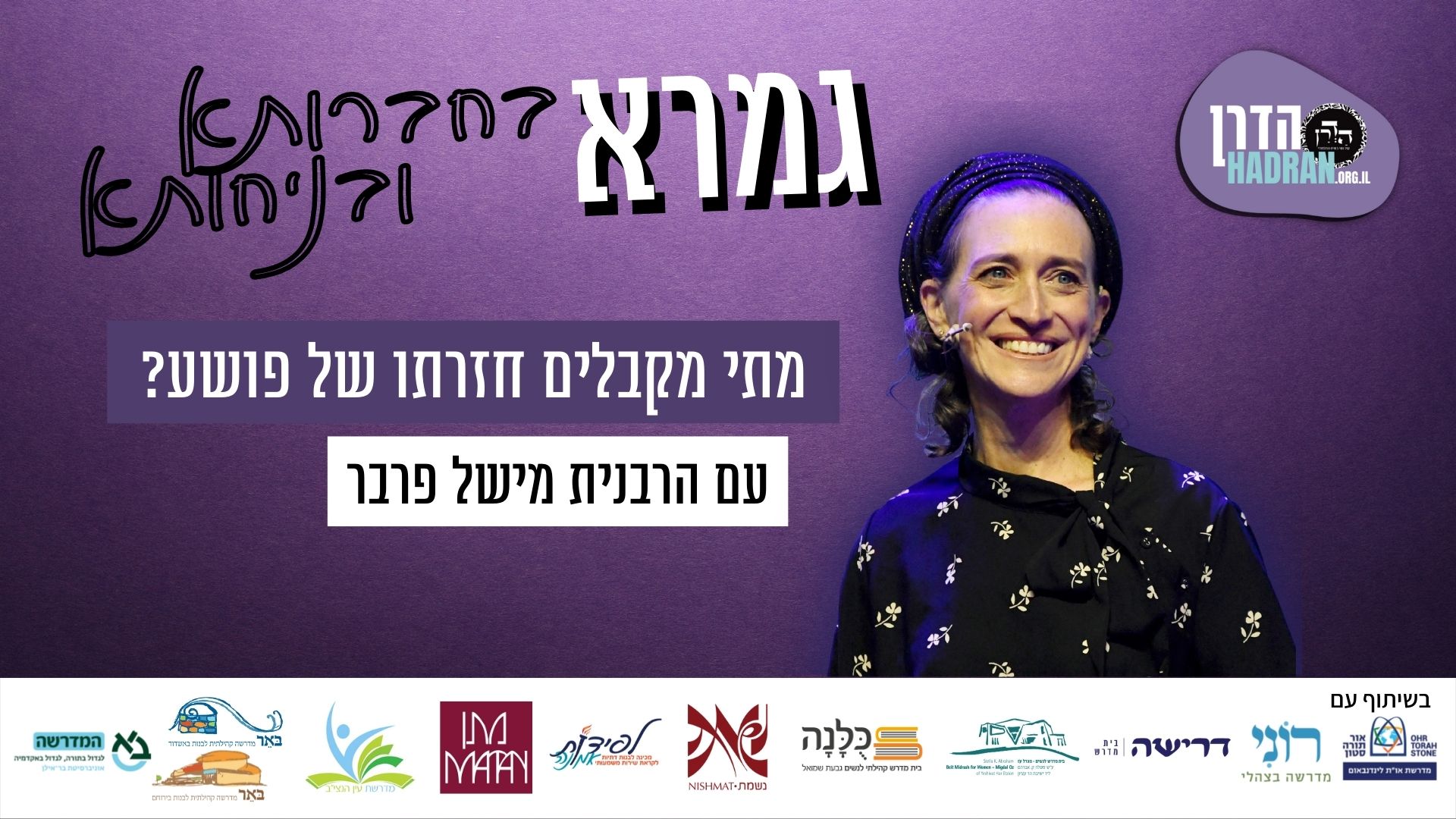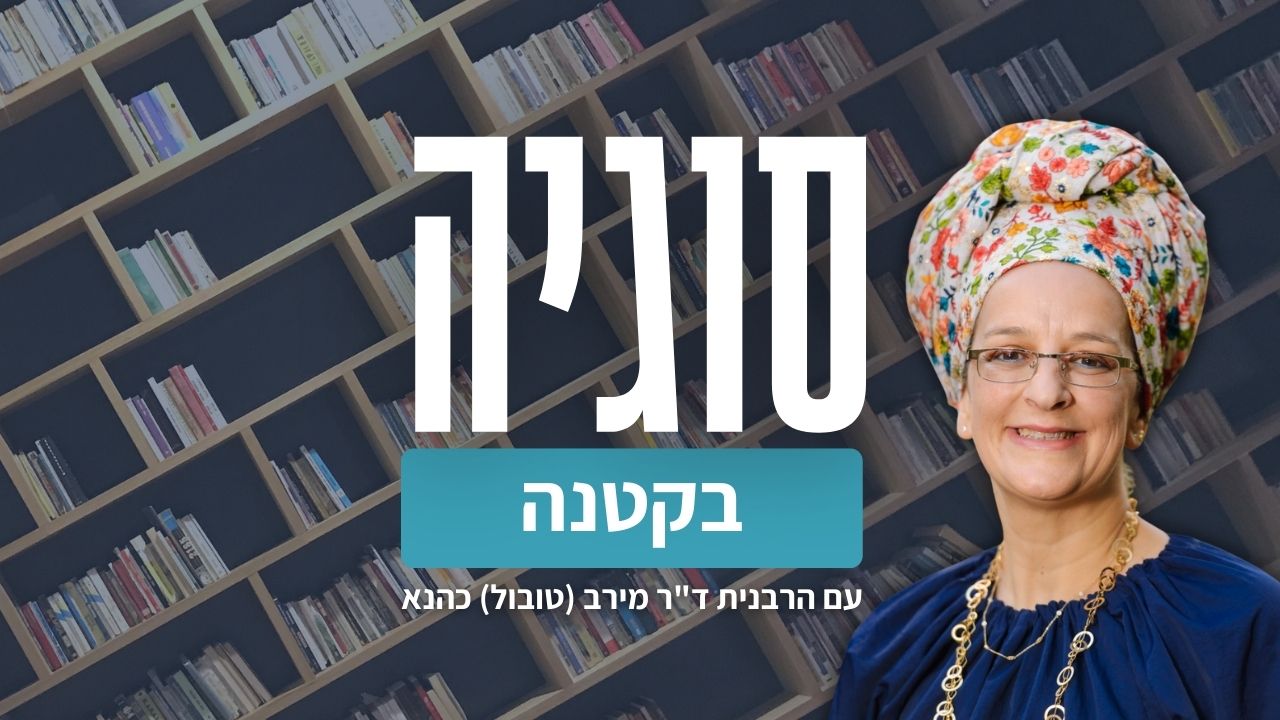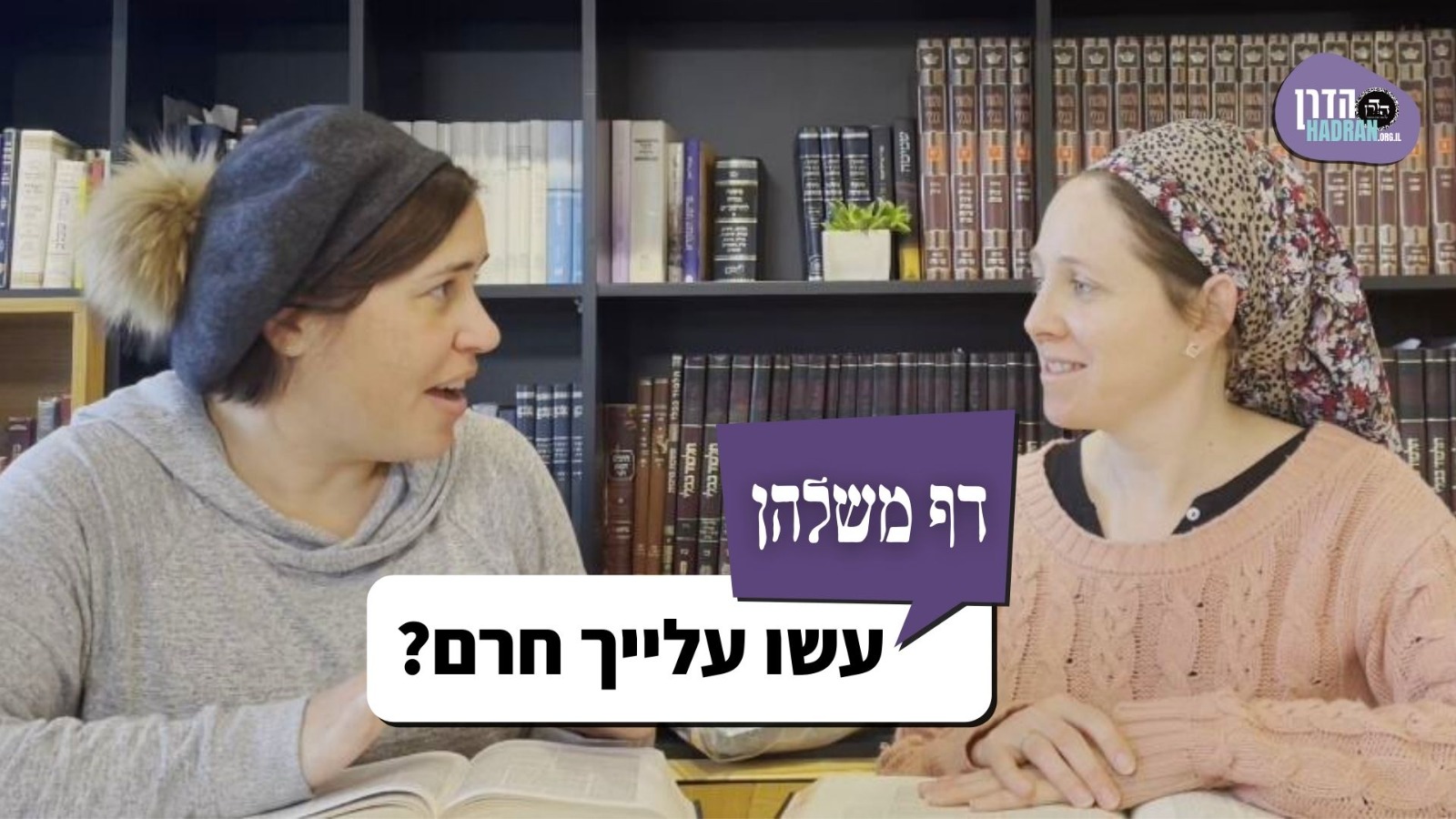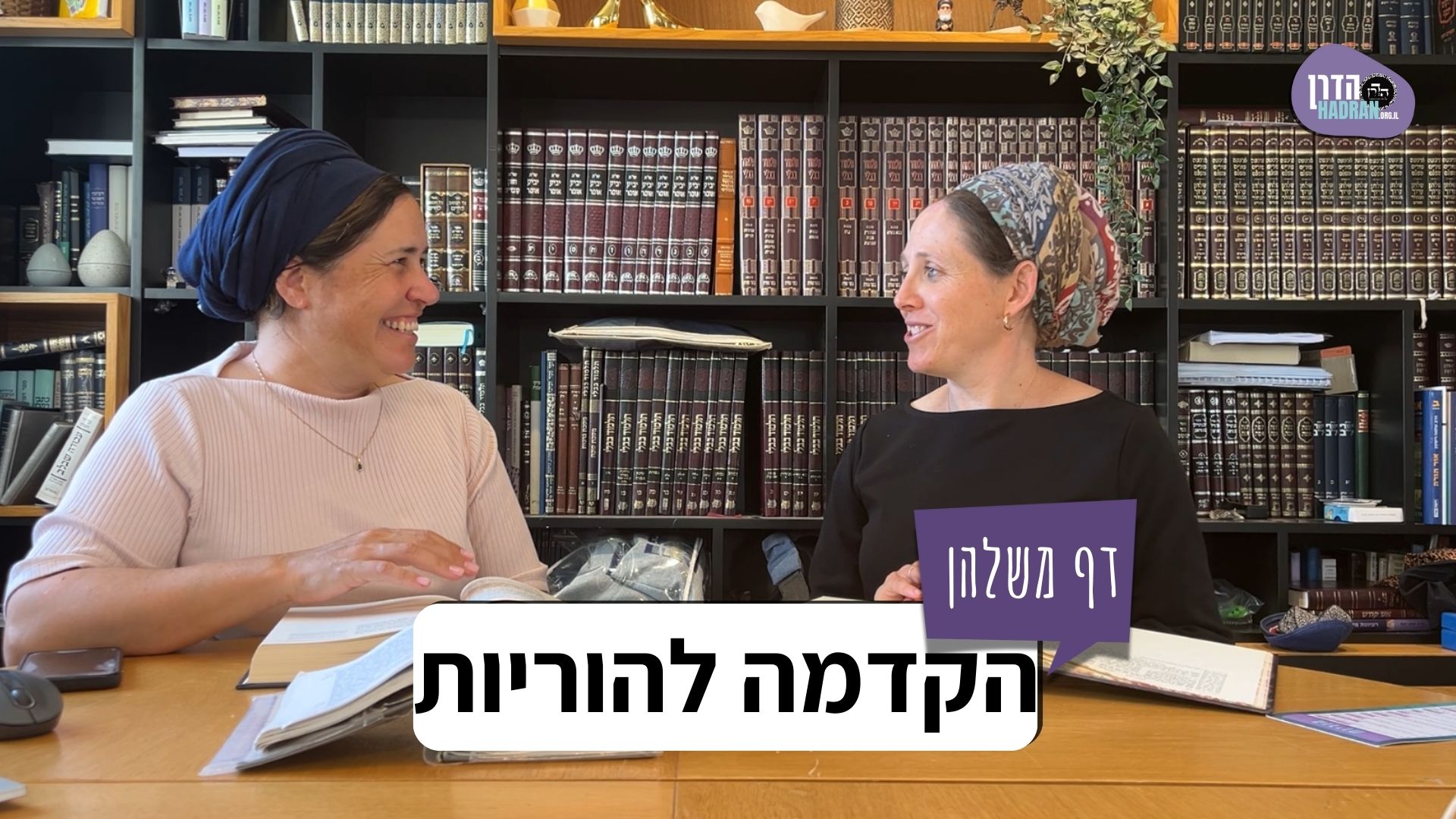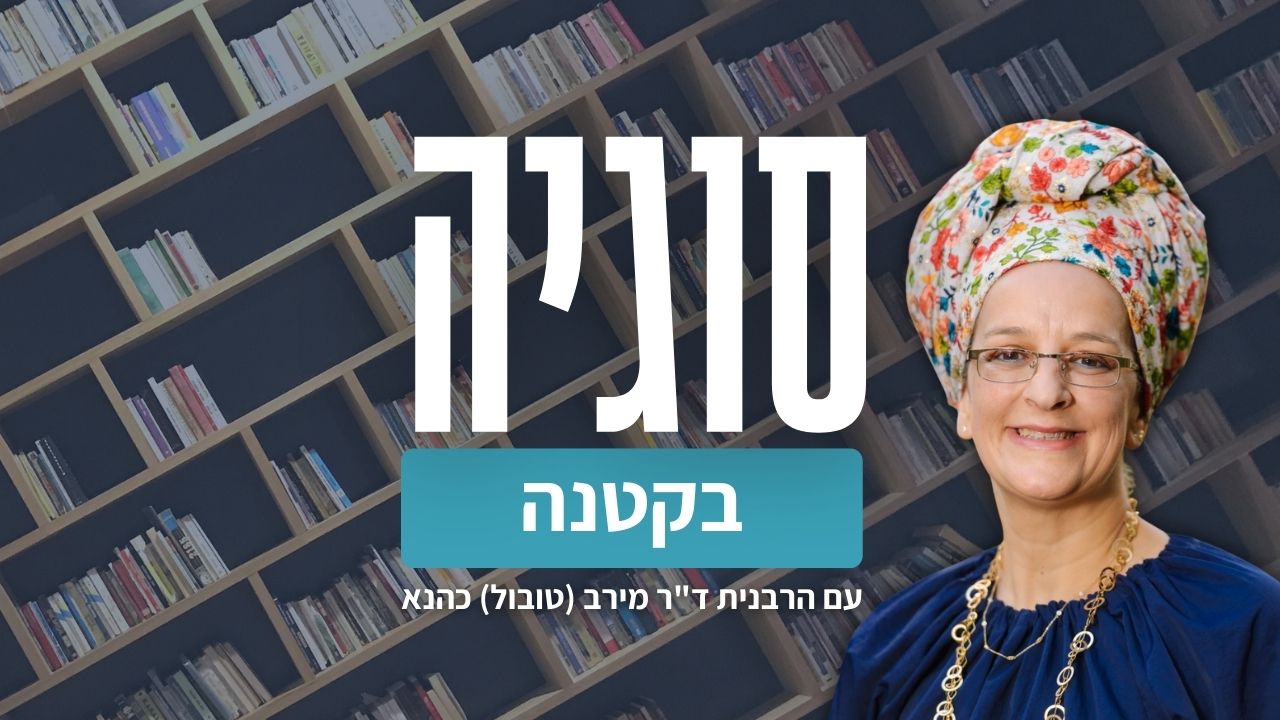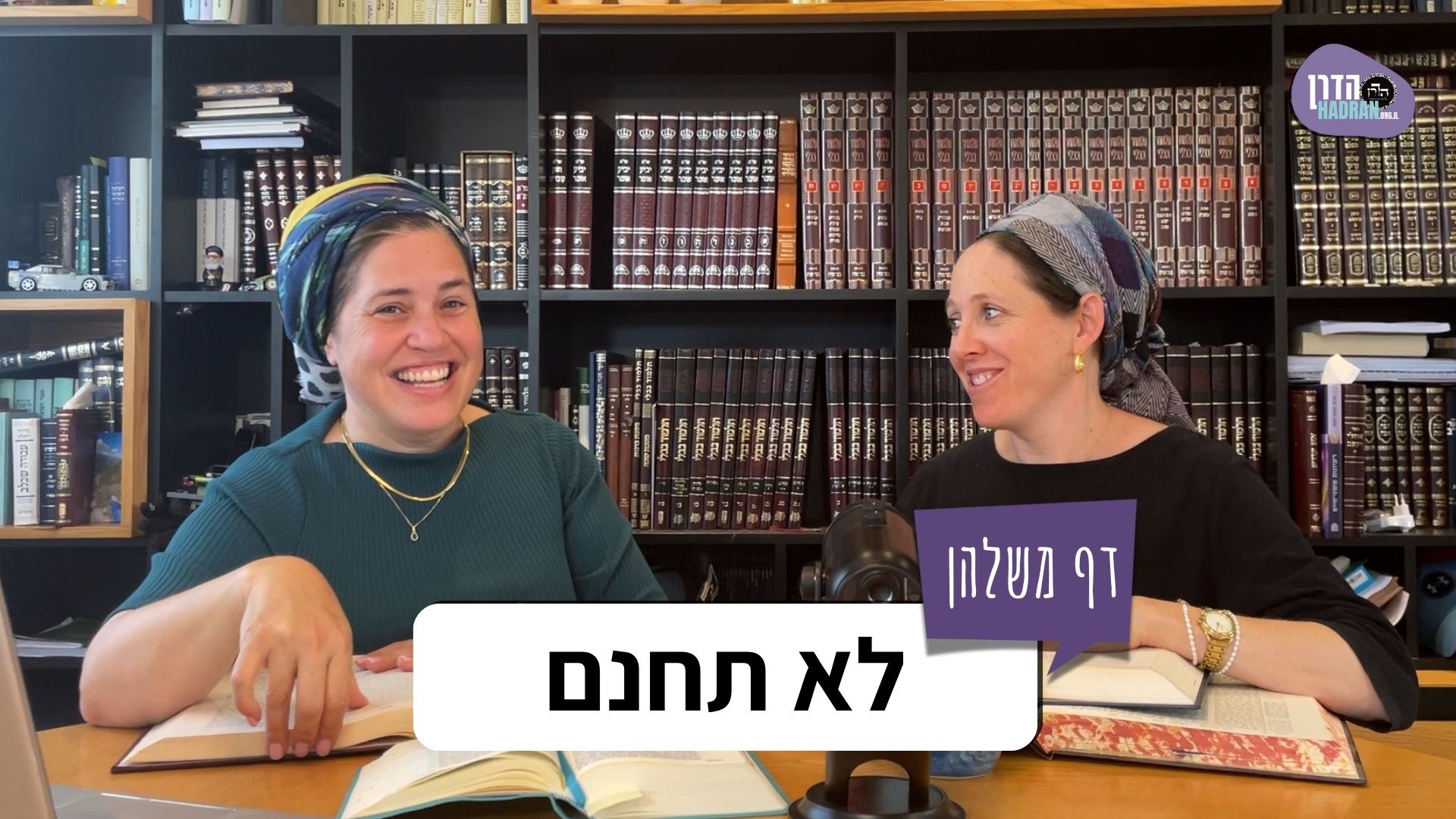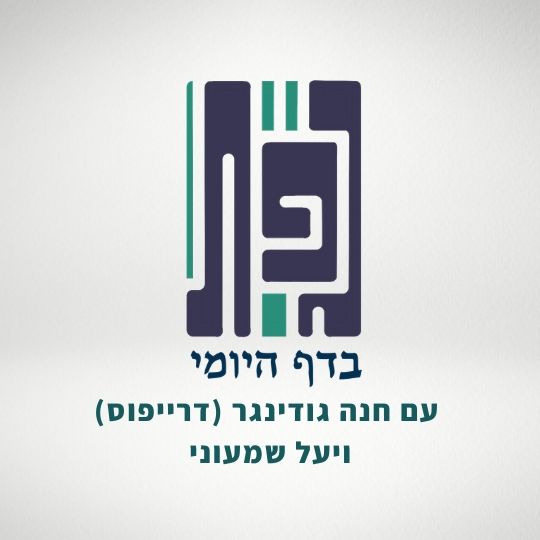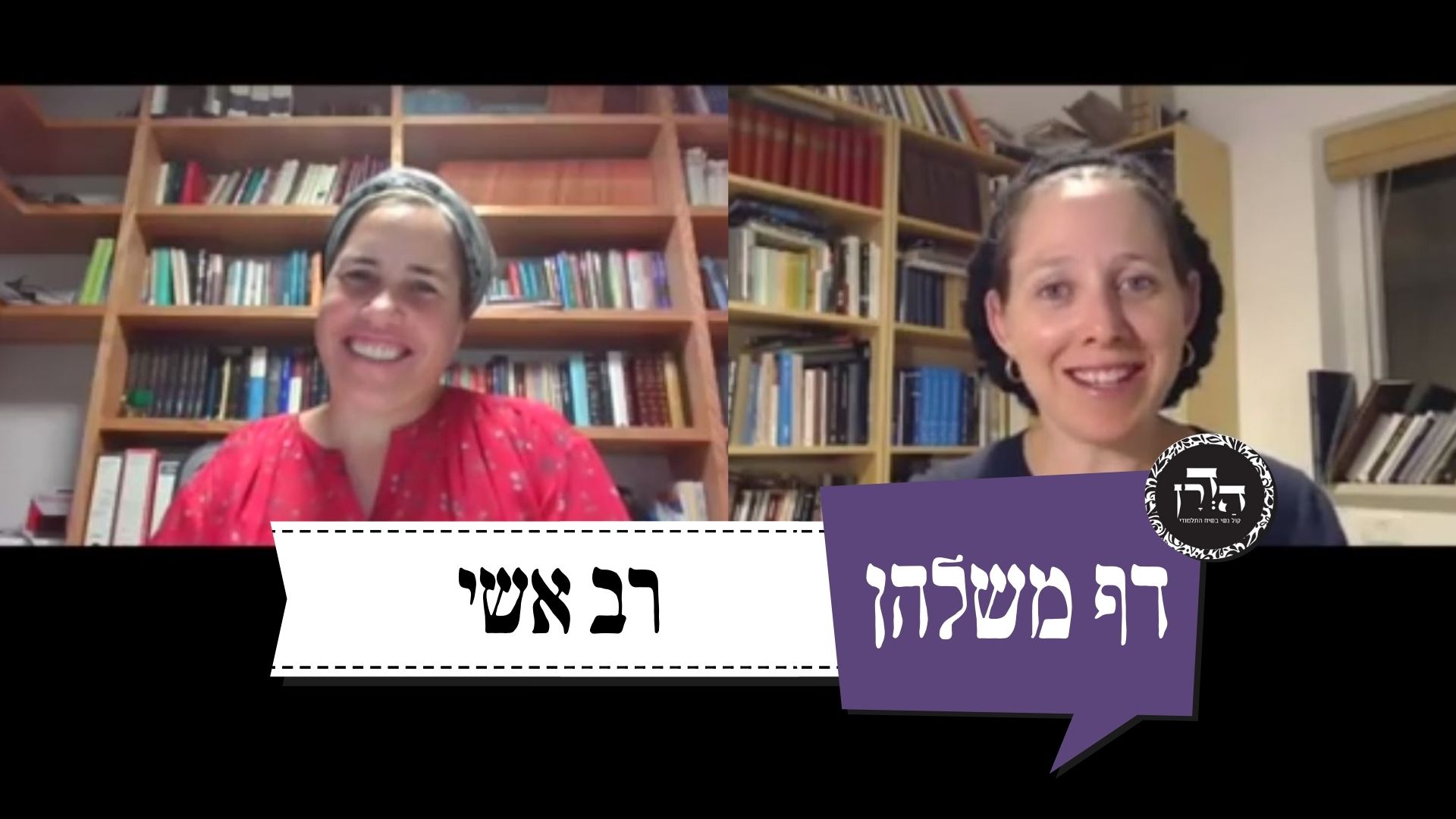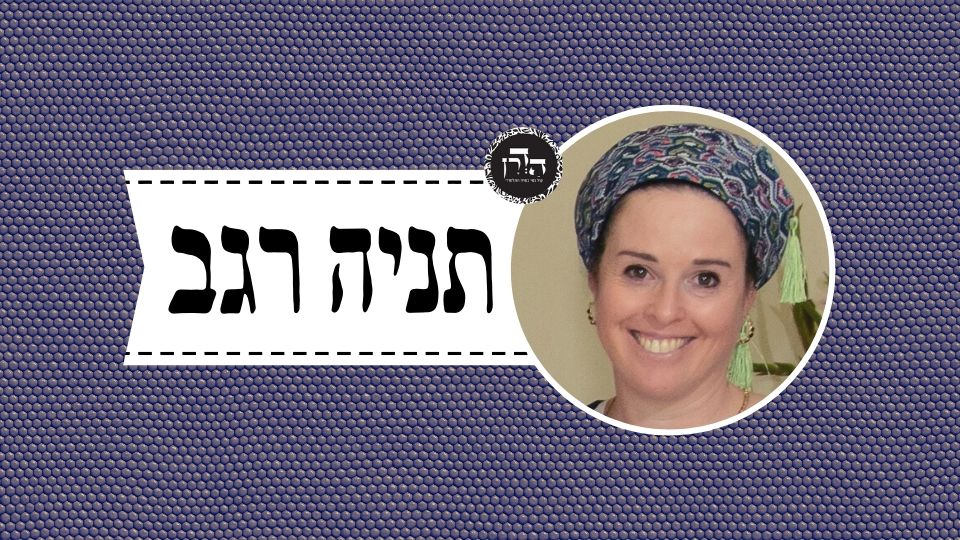איך הקטירו את הקטורת והתשתחוו במקדש? איך ומתי שרו ונגנו ותקעו בחצוצרות?
רוצה להקדיש שיעור?
כלים
העמקה
רוצה להבין מה באמת קורה מתחת לפני השטח של הסוגיה?
שיעורים, פודקאסטים והרחבות של מיטב המורות שלנו יפתחו לך עוד זוויות וכיווני חשיבה.
חדשה בלימוד הגמרא?
זה הדף הראשון שלך? איזו התרגשות עצומה! יש לנו בדיוק את התכנים והכלים שיעזרו לך לעשות את הצעדים הראשונים ללמידה בקצב וברמה שלך, כך תוכלי להרגיש בנוח גם בתוך הסוגיות המורכבות ומאתגרות.
פסיפס הלומדות שלנו
גלי את קהילת הלומדות שלנו, מגוון נשים, רקעים וסיפורים. כולן חלק מתנועה ומסע מרגש ועוצמתי.
תמיד לג
מָלֵא וְגָדוּשׁ קְטֹרֶת, וְכִסּוּי הָיָה לוֹ. וּכְמִין מְטוֹטֶלֶת הָיָה עָלָיו מִלְּמַעְלָן.
The vessel was filled to overflow with incense. And it had a cover to prevent spillage of the incense, and there was a type of cloth placed upon it from above, to preserve the fragrance of the incense.
ה מִי שֶׁזָּכָה בַּמַּחְתָּה, נָטַל מַחְתַּת הַכֶּסֶף וְעָלָה לְרֹאשׁ הַמִּזְבֵּחַ, וּפִנָּה אֶת הַגֶּחָלִים הֵילָךְ [וְהֵילָךְ], וְחָתָה (מִן הַמְאוּכָּלוֹת הַפְּנִימִיּוֹת). יָרַד וְעֵירָן לְתוֹךְ שֶׁל זָהָב, נִתְפַּזֵּר מִמֶּנּוּ כְּקַב גֶּחָלִים, וְהָיָה מְכַבְּדָן לָאַמָּה.
MISHNA 5:5 The priest who won the right to bring the coal pan with the coals from the outer altar to the incense altar in the Sanctuary took the silver coal pan, ascended to the top of the outer altar, and cleared the extinguished coals from the perimeter of the flame to here and to there. Then he shoveled four kav from the consumed inner coals, which were burned in the depths of the flame, into the coal pan. He descended from the altar and emptied the coals into the coal pan made of gold. Approximately one kav of coals from it was spilled and scattered on the courtyard floor, as the capacity of the gold pan was only three kav. And a priest would sweep the scattered coals into the Temple courtyard drain that passed through the courtyard to drain the waste outside the Temple.
וּבַשַּׁבָּת הָיָה כּוֹפֶה עֲלֵיהֶן פְּסַכְתֵּר. וּפְסַכְתֵּר הָיְתָה כְּלִי גָּדוֹל מַחְזֶקֶת לֶתֶךְ. וּשְׁתֵּי שַׁרְשְׁרוֹת הָיוּ בָּהּ, אַחַת – שֶׁהוּא מוֹשֵׁךְ בָּהּ וְיוֹרֵד. וְאַחַת – שֶׁהוּא אוֹחֵז בָּהּ מִלְּמַעְלָן, בִּשְׁבִיל שֶׁלֹּא תִּתְגַּלְגֵּל.
And on Shabbat, when it is prohibited to extinguish fire, the priest would not sweep the coals into the canal; rather, he would overturn a pesakhter upon them. And the pesakhter was a large vessel that held a half-kor. And since the pesakhter was a very heavy vessel, there were two chains on it, to facilitate its standard use, removal of ashes from the altar: One chain with which a priest would pull the vessel filled with ashes down the ramp, and one chain that another priest would grasp from above, so that the vessel would not roll down the ramp and the ashes would not spill.
וּשְׁלֹשָׁה דְּבָרִים הָיְתָה מְשַׁמֶּשֶׁת: כּוֹפִין אוֹתָהּ עַל גַּבֵּי גֶּחָלִים, וְעַל הַשֶּׁרֶץ בַּשַּׁבָּת, וּמוֹרִידִין בָּהּ אֶת הַדֶּשֶׁן מֵעַל גַּבֵּי הַמִּזְבֵּחַ.
And the pesakhter would serve three purposes: The priests would overturn it upon the coals that scattered in the Temple during the transfer from the silver to the gold coal pan on Shabbat, and they would overturn it upon the carcass of a creeping animal found in the Temple on Shabbat, and they would take the ashes down from atop the altar in it.
ו הִגִּיעוּ בֵּין הָאוּלָם וְלַמִּזְבֵּחַ, נָטַל אֶחָד אֶת הַמַּגְרֵפָה וּזְרָקָהּ בֵּין הָאוּלָם וְלַמִּזְבֵּחַ. אֵין אָדָם שׁוֹמֵעַ קוֹל חֲבֵירוֹ בִּירוּשָׁלַיִם מִקּוֹל הַמַּגְרֵפָה.
MISHNA 5:6 The priest with the spoonful of incense and the priest with the gold coal pan filled with coals reached the place between the Entrance Hall to the Sanctuary and the outer altar, on their way to the Sanctuary. One of them took the shovel and threw it between the Entrance Hall and the outer altar. No person could hear the voice of another speaking to him in Jerusalem, due to the sound generated by the shovel.
וּשְׁלֹשָׁה דְּבָרִים הָיְתָה מְשַׁמֶּשֶׁת: כֹּהֵן שֶׁשּׁוֹמֵעַ אֶת קוֹלָהּ, יוֹדֵעַ שֶׁאֶחָיו הַכֹּהֲנִים נִכְנָסִים לְהִשְׁתַּחֲווֹת, וְהוּא רָץ וּבָא. וּבֶן לֵוִי שֶׁהוּא שׁוֹמֵעַ אֶת קוֹלָהּ, יוֹדֵעַ שֶׁאֶחָיו הַלְוִיִּם נִכְנָסִים לְדַבֵּר בַּשִּׁיר, וְהוּא רָץ וּבָא. וְרֹאשׁ הַמַּעֲמָד, הָיָה מַעֲמִיד אֶת הַטְּמֵאִים בְּשַׁעַר הַמִּזְרָח.
And that sound would serve three purposes: Any priest who hears its sound knows that his brethren the priests are entering to prostrate themselves in the Sanctuary at that time, and he would run and come to prostrate himself with them. And any Levite who hears its sound knows that his brethren the Levites are entering the courtyard to stand on their platform to recite the psalm accompanying the libation, and he would run and come to sing with them. And the head of the non-priestly watch, which stands in the courtyard as the agents of the Jewish people, would position the ritually impure priests and singers at the eastern gate of the courtyard, to make it clear that those priests were not performing the Temple service due to their ritual impurity.
הֲדַרַן עֲלָךְ אָמַר לָהֶם הַמְמוּנֶּה
א הֵחֵלּוּ עוֹלִים בְּמַעֲלוֹת הָאוּלָם. מִי שֶׁזָּכוּ בְּדִישּׁוּן מִזְבֵּחַ הַפְּנִימִי וְהַמְּנוֹרָה הָיוּ מַקְדִּימִים לִפְנֵיהֶם. מִי שֶׁזָּכָה בְּדִישּׁוּן מִזְבֵּחַ הַפְּנִימִי – נִכְנַס וְנָטַל אֶת הַטְּנִי, וְהִשְׁתַּחֲוָה וְיָצָא.
MISHNA: 6:1 The priest with the panful of incense and the priest with the gold coal pan filled with coals began ascending the twelve stairs of the Entrance Hall. The priests who won the rights of the removal of ash from the inner altar and the removal of ash from the Candelabrum would precede them, to remove the vessels that remained in the Sanctuary. The priest who won the right of the removal of ash from the inner altar entered the Sanctuary and took the basket that he had left there after removing the ashes from the altar. And when he completed his tasks, he prostrated himself with his hands and feet spread and emerged from the Sanctuary.
מִי שֶׁזָּכָה בְּדִישּׁוּן הַמְּנוֹרָה, נִכְנַס וּמָצָא שְׁתֵּי נֵרוֹת מַעֲרָבִיִּים דּוֹלְקִין. מְדַשֵּׁן אֶת הַמִּזְרָחִי, וּמַנִּיחַ אֶת הַמַּעֲרָבִי דּוֹלֵק. שֶׁמִּמֶּנּוּ הָיָה מַדְלִיק אֶת הַמְּנוֹרָה שֶׁל בֵּין הָעַרְבַּיִם. מְצָאוֹ שֶׁכָּבָה, מְדַשְּׁנוֹ וּמַדְלִיקוֹ מִמִּזְבַּח הָעוֹלָה. נָטַל אֶת הַכּוּז מִמַּעֲלָה שְׁנִיָּה, וְהִשְׁתַּחֲוָה וְיָצָא.
The priest who won the right of the removal of ash from the Candelabrum entered the Sanctuary, and if he found the two western lamps, i.e., the easternmost and the one immediately to its west, of the Candelabrum burning, he would remove the ash from the easternmost lamp and prepare it anew. But he would leave burning the lamp immediately west of the easternmost lamp, as from that lamp he would kindle the lamps of the Candelabrum in the afternoon. If he found that the lamp west of the easternmost lamp was extinguished, he would remove the ashes and kindle it from the fire on the altar of the burnt offering. He then took the jug in which he had placed the ashes and wicks of the Candelabrum from the second stair of the stone before the Candelabrum and prostrated himself and emerged from the Sanctuary.
ב מִי שֶׁזָּכָה בַּמַּחְתָּה, צָבַר אֶת הַגֶּחָלִים עַל גַּבֵּי הַמִּזְבֵּחַ, וְרִדְדָּן בְּשׁוּלֵי הַמַּחְתָּה, וְהִשְׁתַּחֲוָה וְיָצָא.
MISHNA 6:2 The priest who won the right to bring the coal pan filled with coals to the inner altar for the burning of the incense first piled the coals on the inner altar and then flattened them, distributing them evenly on the altar with the bottom of the coal pan. And when he finished distributing the coals, he prostrated himself and emerged from the Sanctuary.
ג מִי שֶׁזָּכָה בַּקְּטֹרֶת, הָיָה נוֹטֵל אֶת הַבָּזֵךְ מִתּוֹךְ הַכַּף, וְנוֹתְנוֹ לְאוֹהֲבוֹ אוֹ לִקְרוֹבוֹ. נִתְפַּזֵּר מִמֶּנּוּ לְתוֹכוֹ – נוֹתְנוֹ לוֹ בְּחׇפְנָיו. וּמְלַמְּדִים אוֹתוֹ: הֱוֵי זָהִיר שֶׁמָּא תַּתְחִיל מִפָּנֶיךָ, שֶׁלֹּא תִּכָּוֶה.
MISHNA 6:3 The priest who won the right to burn the incense would take the smaller vessel containing the incense from within the spoon, and would give it to a priest who is his friend or his relative, whom he designated to assist him, and enter the Sanctuary with him. If the incense was scattered from the smaller vessel into the spoon, the priest accompanying him would give the incense to the priest burning the incense in his handfuls. And the experienced priests would teach the priest burning the incense: Be careful, because if you are not careful you might begin scattering the incense on the side of the altar that is before you; rather, start scattering on the far side of the altar, so that you will not be burned by the burning incense when you are scattering it.
הִתְחִיל מְרַדְּדָן וְיוֹצֵא. לֹא הָיָה הַמַּקְטִיר מַקְטִיר עַד שֶׁהַמְמוּנֶּה אוֹמֵר לוֹ: הַקְטֵר! וְאִם הָיָה כֹּהֵן גָּדוֹל, הַמְמוּנֶּה אוֹמֵר לוֹ: ״אִישִׁי כֹּהֵן גָּדוֹל, הַקְטֵר״!
The priest began flattening it, distributing the incense evenly on the coals on the altar, and when the Sanctuary would become filled with the smoke of the incense, he would emerge from the Sanctuary. The priest burning the incense would not burn it until the appointed priest would say to him: Burn the incense. And if it was the High Priest who was burning the incense, the appointed priest would say to him deferentially: My master, the High Priest, burn the incense.
פָּרְשׁוּ הָעָם, וְהִקְטִיר וְהִשְׁתַּחֲוָה וְיָצָא.
It is derived from the verse: “And there shall be no man in the Tent of Meeting when he goes in to make atonement in the Sanctuary, until he comes out” (Leviticus 16:17), that no one may be standing between the Entrance Hall and the outer altar when the priest burns the incense. Therefore, the people, i.e., the priests, left that area. And the priest burned the incense on the inner altar and prostrated himself and emerged from the Sanctuary.
הֲדַרַן עֲלָךְ הֵחֵלּוּ עוֹלִים
MISHNA: 7:1 After the priests concluded sacrificing the daily morning offering, they would enter the Sanctuary to prostrate themselves. On occasions when the High Priest would enter the Sanctuary to prostrate himself, he would enter before the other priests. When the High Priest enters the Sanctuary, three priests hold him to assist him and support him, in order to distinguish the service of the High Priest from that of the other priests entering the Sanctuary. One priest held his right hand and one priest held his left hand, and one priest stood behind the High Priest, holding onto the two precious onyx stones located on the shoulders of the High Priest, on the ephod.
בִּזְמַן שֶׁכֹּהֵן גָּדוֹל נִכְנָס לְהִשְׁתַּחֲוֹת, שְׁלֹשָׁה אוֹחֲזִין בּוֹ: אֶחָד בִּימִינוֹ, וְאֶחָד בִּשְׂמֹאלוֹ, וְאֶחָד בַּאֲבָנִים טוֹבוֹת.
And once the appointed priest heard the sound from the feet of the High Priest, produced by the bells attached to the bottom of his robe, he knew that the High Priest was emerging from the Sanctuary, and he lifted the curtain suspended at the opening of the Entrance Hall for him, to facilitate his exit. After the High Priest entered and prostrated himself and emerged from the Sanctuary, his brethren the priests entered, prostrated themselves, and emerged from the Sanctuary.
וְכֵיוָן שֶׁשָּׁמַע הַמְמוּנֶּה קוֹל רַגְלָיו שֶׁל כֹּהֵן גָּדוֹל שֶׁהוּא יוֹצֵא, הִגְבִּיהַּ לוֹ אֶת הַפָּרוֹכֶת. נִכְנַס, וְהִשְׁתַּחֲוָה וְיָצָא. נִכְנְסוּ אֶחָיו הַכֹּהֲנִים, הִשְׁתַּחֲווּ וְיָצְאוּ.
MISHNA 7:2 After the priests emerged from the Sanctuary, they came and stood on the twelve stairs before the Entrance Hall. The first five priests stood to the south of their brethren, the priests, who had taken the limbs of the daily offering up to the altar. And those five priests had five vessels in their hands: The basket with the ashes from the inner altar was in the hands of one priest; and the jug with the ashes from the Candelabrum was in the hands of one priest; and the coal pan was in the hands of one priest; and the smaller vessel, the bowl that held the incense, was in the hands of one priest, who had burned the incense; and the spoon and its cover were in the hands of one priest, the friend or relative of the one who burned the incense.
בָּאוּ וְעָמְדוּ עַל מַעֲלוֹת הָאוּלָם. עָמְדוּ הָרִאשׁוֹנִים לִדְרוֹם אֲחֵיהֶם הַכֹּהֲנִים, וַחֲמִשָּׁה כֵּלִים בְּיָדָם: הַטְּנִי בְּיַד אֶחָד, וְהַכּוּז בְּיַד אֶחָד, וְהַמַּחְתָּה בְּיַד אֶחָד, וְהַבָּזֵךְ בְּיַד אֶחָד, וְכַף וְכִסּוּיוֹ בְּיַד אֶחָד.
The priests placed their vessels on the ground and then blessed the people, reciting one blessing. The Priestly Benediction was recited outside the Temple as well, but in the Temple, it was recited differently, as in the rest of the country the priests would recite it as three blessings, and the listeners would answer amen after each blessing. But in the Temple they would recite it as one blessing, and the listeners would not respond to each blessing. Rather, at the conclusion of the entire Priestly Benediction they would answer: Blessed are You Lord, God of Israel, from everlasting to everlasting. In the Temple, the priests would recite the name of God as it is written, with the letters yod, heh, vav, heh, whereas in the rest of the country the priests would recite the name of God by His appellation, alef, dalet, nun, yod.
וּבֵרְכוּ אֶת הָעָם בְּרָכָה אַחַת. אֶלָּא שֶׁבַּמְּדִינָה אוֹמְרִים אוֹתָהּ שָׁלֹשׁ בְּרָכוֹת, וּבַמִּקְדָּשׁ בְּרָכָה אַחַת. בַּמִּקְדָּשׁ הָיוּ אוֹמְרִים אֶת הַשֵּׁם כִּכְתָבוֹ, וּבַמְּדִינָה בְּכִנּוּיוֹ.
Furthermore, in the rest of the country, while reciting the Priestly Benediction the priests lift their hands opposite their shoulders, and in the Temple they raise them above their heads. That is the halakha with regard to all priests in the Temple, except for the High Priest, who does not raise his hands above the frontplate on his forehead, as the name of God is written on the frontplate. Rabbi Yehuda says: Even the High Priest would raise his hands above the frontplate while reciting the Priestly Benediction in the Temple, as it is stated with regard to the Priestly Benediction recited by Aaron the High Priest: “And Aaron lifted his hands toward the people and blessed them” (Leviticus 9:22).
בַּמְּדִינָה – הַכֹּהֲנִים נוֹשְׂאִים אֶת יְדֵיהֶם כְּנֶגֶד כִּתְפֵיהֶם, וּבַמִּקְדָּשׁ – עַל גַּבֵּי רָאשֵׁיהֶן. חוּץ מִכֹּהֵן גָּדוֹל, שֶׁאֵין מַגְבִּיהַּ אֶת יָדָיו לְמַעְלָה מִן הַצִּיץ. רַבִּי יְהוּדָה אוֹמֵר: אַף כֹּהֵן גָּדוֹל מַגְבִּיהַּ אֶת יָדָיו לְמַעְלָה מִן הַצִּיץ, שֶׁנֶּאֱמַר: ״וַיִּשָּׂא אַהֲרֹן אֶת יָדָיו אֶל הָעָם וַיְבָרְכֵם״.
MISHNA 7:3 The High Priest is entitled to sacrifice any offering brought to the Temple, at his discretion. When the High Priest wishes to burn the limbs of the daily offering and the accompanying meal offering, he would ascend the ramp to the altar, and the deputy High Priest would walk to his right. When he reached half the height of the ramp, the Deputy would hold his right hand and take him up to the altar at the top of the ramp.
בִּזְמַן שֶׁכֹּהֵן גָּדוֹל רוֹצֶה לְהַקְטִיר, הָיָה עוֹלֶה בַּכֶּבֶשׁ, וְהַסְּגָן בִּימִינוֹ. הִגִּיעַ לְמַחֲצִית הַכֶּבֶשׁ, אָחַז הַסְּגָן בִּימִינוֹ וְהֶעֱלָהוּ.
And the first of the nine priests who took the limbs up to the altar handed the High Priest the head and the hind leg of the offering, and the High Priest placed his hands upon them and then threw them onto the altar fire. Next the second of the nine priests handed the two forelegs of the offering to the first priest. He gave them to the High Priest, who placed his hands upon them and then threw them onto the altar fire. At that point, the second priest slipped away and left. And in that manner the priests would hand the High Priest the rest of all the limbs, and he would place his hands upon them and then throw them onto the altar fire. And when he wishes, he places his hands and others throw the limbs onto the fire.
וְהוֹשִׁיט לוֹ הָרִאשׁוֹן הָרֹאשׁ וְהָרֶגֶל, וְסָמַךְ עֲלֵיהֶן, וּזְרָקָן. הוֹשִׁיט הַשֵּׁנִי לָרִאשׁוֹן שְׁתֵּי הַיָּדַיִם, נוֹתְנָן לְכֹהֵן גָּדוֹל, וְסָמַךְ עֲלֵיהֶן, וּזְרָקָן. נִשְׁמַט הַשֵּׁנִי וְהָלַךְ לוֹ. וְכָךְ הָיוּ מוֹשִׁיטִין לוֹ שְׁאָר כׇּל הָאֵבָרִין, וְהוּא סוֹמֵךְ עֲלֵיהֶן וְזוֹרְקָן. וּבִזְמַן שֶׁהוּא רוֹצֶה – הוּא סוֹמֵךְ, וַאֲחֵרִים זוֹרְקִין.
When the High Priest, who was at the top of the ramp on the south side of the altar, came to circle the altar to reach the southwestern corner, where he would pour the libation of wine, from where does he begin? He begins from the southeastern corner and continues to the northeastern corner, then to the northwestern corner, and ultimately reaches the southwestern corner. At that point, the priests gave him wine to pour.
בָּא לוֹ לְהַקִּיף אֶת הַמִּזְבֵּחַ, מֵהֵיכָן הוּא מַתְחִיל – מִקֶּרֶן דְּרוֹמִית מִזְרָחִית, מִזְרָחִית צְפוֹנִית, צְפוֹנִית מַעֲרָבִית, מַעֲרָבִית דְּרוֹמִית. נָתְנוּ לוֹ יַיִן לְנַסֵּךְ.
The Deputy stands at the High Priest’s side at the corner of the altar and the cloths are in his hand, so that he can wave them to signal to the Levites to begin singing when the High Priest pours the libation. Two priests stand at the marble table of the fats, where the limbs and fats were placed before being taken to the altar, and there were two silver trumpets in their hands. These two priests sounded a tekia, a long continuous blast; they then sounded a terua, a series of staccato blasts; and lastly they sounded another tekia to alert the Levites to prepare to recite the psalm.
הַסְּגָן עוֹמֵד עַל הַקֶּרֶן, וְהַסּוּדָרִים בְּיָדוֹ. שְׁנֵי כֹּהֲנִים עוֹמְדִין עַל שֻׁלְחַן הַחֲלָבִים, וּשְׁתֵּי חֲצוֹצְרוֹת בְּיָדָם. תָּקְעוּ וְהֵרִיעוּ וְתָקְעוּ.
The priests with the trumpets came and stood near ben Arza, the title given to the person who was tasked with striking the cymbals, one to his right and one to his left. Then the High Priest stooped to pour the libation, and the Deputy waved the cloths, and ben Arza struck the cymbals, and the Levites recited the psalm of that day of the week. Each psalm was divided into three sections. Whenever the Levites reached the end of one section of the psalm, the priests sounded a tekia, and the people in the courtyard prostrated themselves. At the end of each section there was a tekia, and for every tekia there was a prostration. That is the procedure for the sacrifice of the daily offering in the service of the House of our God; may it be His will that it will be speedily rebuilt in our day, amen.
בָּאוּ וְעָמְדוּ אֵצֶל בֶּן אַרְזָא, אֶחָד מִימִינוֹ וְאֶחָד מִשְּׂמֹאלוֹ. שָׁחָה לְנַסֵּךְ, וְהֵנִיף הַסְּגָן בַּסּוּדָרִים, וְהִקִּישׁ בֶּן אַרְזָא בַּצִּלְצָל, וְדִבְּרוּ הַלְוִיִּם בַּשִּׁיר. הִגִּיעוּ לַפֶּרֶק, תָּקְעוּ, וְהִשְׁתַּחֲווּ הָעָם. עַל כׇּל פֶּרֶק – תְּקִיעָה, וְעַל כׇּל תְּקִיעָה – הִשְׁתַּחֲוָיָה. זֶהוּ סֵדֶר הַתָּמִיד לַעֲבוֹדַת בֵּית אֱלֹהֵינוּ, יְהִי רָצוֹן שֶׁיִּבָּנֶה בִּמְהֵרָה בְּיָמֵינוּ, אָמֵן.
MISHNA 7:4 The following is a list of each daily psalm that the Levites would recite in the Temple. On the first day of the week they would recite the psalm beginning: “A psalm of David. The earth is the Lord’s and all it contains, the world and all who live in it” (Psalms, chapter 24). On the second day they would recite the psalm beginning: “A song; a psalm of the sons of Korah. Great is the Lord and highly to be praised in the city of God, on His sacred mountain” (Psalms, chapter 48). On the third day they would recite the psalm beginning: “A psalm of Asaph. God stands in the divine assembly; among the judges He delivers judgment” (Psalms, chapter 82). On the fourth day they would recite the psalm beginning: “O Lord God, to Whom vengeance belongs, God to Whom vengeance belongs, shine forth” (Psalms, chapter 94). On the fifth day they would recite the psalm beginning: “For the leader; upon the Gittith, a psalm of Asaph. Sing for joy to God, our strength; shout aloud to the God of Jacob” (Psalms, chapter 81). On the sixth day they would recite the psalm beginning: “The Lord reigns: He is robed in majesty; the Lord is robed, girded with strength” (Psalms, chapter 93). On Shabbat they would recite the psalm beginning: “A psalm, a song for Shabbat day” (Psalms, chapter 92). This is interpreted as a psalm, a song for the future, for the day that will be entirely Shabbat and rest for everlasting life.
הַשִּׁיר שֶׁהָיוּ הַלְוִיִּם אוֹמְרִים בַּמִּקְדָּשׁ: בַּיּוֹם הָרִאשׁוֹן הָיוּ אוֹמְרִים ״לַה׳ הָאָרֶץ וּמְלוֹאָהּ תֵּבֵל וְיוֹשְׁבֵי בָהּ״. בַּשֵּׁנִי הָיוּ אוֹמְרִים ״גָּדוֹל ה׳ וּמְהֻלָּל מְאֹד בְּעִיר אֱלֹהֵינוּ הַר קׇדְשׁוֹ״. בִּשְׁלִישִׁי הָיוּ אוֹמְרִים ״אֱלֹהִים נִצָּב בַּעֲדַת אֵל בְּקֶרֶב אֱלֹהִים יִשְׁפּוֹט״. בָּרְבִיעִי הָיוּ אוֹמְרִים ״אֵל נְקָמוֹת ה׳ אֵל נְקָמוֹת הוֹפִיעַ״. בַּחֲמִישִׁי הָיוּ אוֹמְרִים ״הַרְנִינוּ לֵאלֹהִים עוּזֵּנוּ הָרִיעוּ לֵאלֹהֵי יַעֲקֹב״. בַּשִּׁשִּׁי הָיוּ אוֹמְרִים ״ה׳ מָלָךְ גֵּאוּת לָבֵשׁ לָבֵשׁ וְגוֹמֵר״. בַּשַּׁבָּת הָיוּ אוֹמְרִים ״מִזְמוֹר שִׁיר לְיוֹם הַשַּׁבָּת״ – מִזְמוֹר שִׁיר לֶעָתִיד לָבוֹא, לְיוֹם שֶׁכּוּלּוֹ שַׁבָּת וּמְנוּחָה לְחַיֵּי הָעוֹלָמִים.
הֲדַרַן עֲלָךְ בִּזְמַן שֶׁכֹּהֵן גָּדוֹל וּסְלִיקָא לַהּ מַסֶּכֶת תָּמִיד


